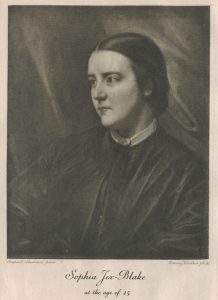
Sophia Jex-Blake was the first of the Edinburgh Seven, and a medical pioneer.
The Edinburgh Seven were a group of women who were the first to study at any British University. These women were Sophia Jex-Blake, Isabel Thorne, Edith Pechey, Matilda Chaplin, Helen Evans, Mary Anderson, and Emily Bovell. Sophia Jex-Blake had applied to study medicine in March 1869 but the University Court rejected her application on the grounds that the university could not make the necessary arrangements ‘in the interest of one lady’. Sophia took to The Scotsman and other newspapers to ask other women to join her petition. Isabel Thorne and Edith Pechey were the first two to respond. Edith Pechey wrote:
Do you think anything more is requisite to ensure success than moderate abilities and a good share of perseverance? I believe I may lay claim to these, together with a real love of the subjects of study, but as regards any thorough knowledge of these subjects at present, I fear I am deficient in most. I am afraid I should not without a good deal of previous study be able to pass the preliminary exam.
The preliminary exam was taken by 152 candidates, 5 of whom were women. After much study, four of these women came in the top 7 results for the exam. Edith Pechey achieved the highest mark in the group. Despite passing the entry requirements to study medicine at university, the university stated women would be taught in classes separate from men and would pay higher fees due to their classes being smaller.
Studying was a hostile environment for the Edinburgh Seven, with both professors and students hurling abuse at them. When the women attempted to attend an exam at Surgeon’s Hall, they found the road blockaded, and were met with groups of students throwing rubbish and insults at them, and the gates closed to them. Eventually let in by a sympathetic student, the riot against the women taking the exam drew much public attention and support. In fact, supporters had formed a General Committee for Securing a Complete Medical Education for Women with over 300 members, including Charles Darwin. Though they eventually lost the fight to be awarded degrees, though they were key in drawing support for the wider issue of equal education for women, and eventually legislation was passed in 1877 allowing women to study at university.
These women were integral to the fight for equal education for women in Britain, and just a small part of the growing feminist presence in Victorian society.
In 1878, Sophia Jex-Blake returned to Edinburgh and established herself in the New Town as the city’s first woman doctor, and set up a clinic for poor patients. Once Scotland started licensing women doctors, Jex-Blake helped found the Edinburgh School of Medicine for Women. Edith Pechey went on to practice in Leeds before becoming senior medical officer at the new Cama Women and Children’s Hospital in Bombay (now Mumbai). Bovell and Marshall worked at the New Hospital for Women in London. Chaplin founded a midwifery school in Tokyo, but later returned to private practice in London.
-Iona Diver
Junior Girl
Girl Museum Inc.
